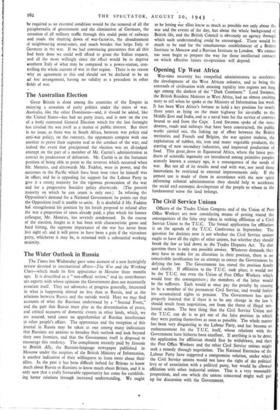The Australian Election
Great Britain is alone among the countries of the Empire in enjoying a cessation of party politics under the stress of war. Australia, like the other Dominions—and, it should be added, like the United States—has had no party truce, and is now on the eve of a hotly contested General Election which for the last fortnight has rivalled the war itself as a matter of public interest. But there is no issue, as there was in South Africa, between war policy and anti-war policy; on the contrary, the opponents compete with one another to prove their superior zeal in the conduct of the war; and indeed the event that precipitated the election was an ill-judged attempt on the part of a member of Mr. Curtin's administration to convict its predecessor of defeatism. Mr. Curtin is in the fortunate position of being able to point to the reverses which occurred when Mr. Menzies, and afterwards Mr. Fadden, were in power, and the successes in the Pacific which have been won since he himself was in office; and he is appealing for support for the Labour Party to give it a strong majority for the vigorous prosecution of the war and for a progressive Socialist policy afterwards. (The present majority on which he can count is only one.) In refusing the Opposition's demand for -a National Government he points out that the Opposition itself is unable to unite. It is doubtful if Mr. Fadden ha1 strengthened his position by his lavish proposal to refund after the war a proportion of taxes already paid, a plan which his former colleague, Mr. Menzies, has severely condemned. In the course of the election, fought as it has been with characteristic gusto and hard hitting, the supreme importance of the war has never been lost sight of; and it will prove to have been a gain if the victorious party, whichever it may be, is returned with a substantial working majority.


























 Previous page
Previous page